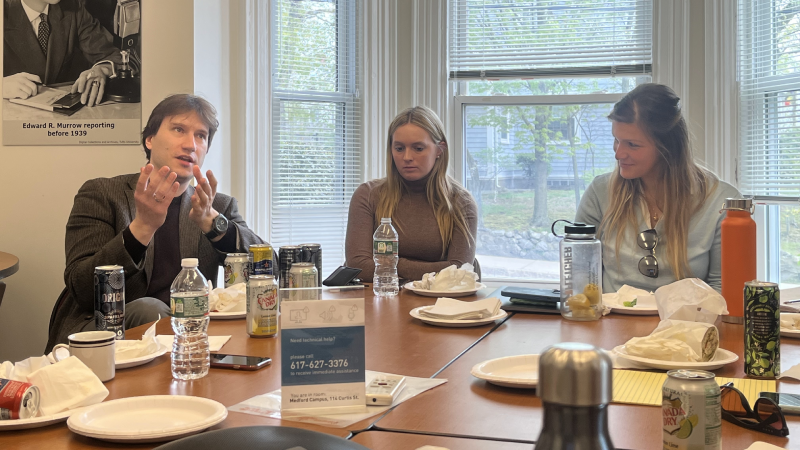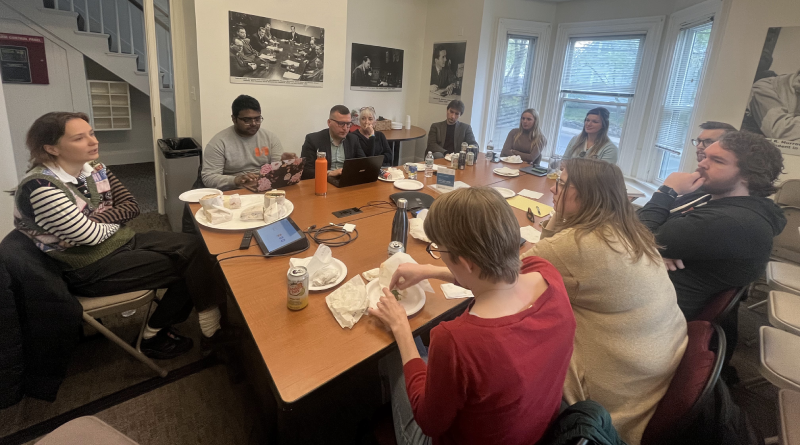Olga Churakova on Investigative Journalism in Russia and Foreign Agents Legislation Worldwide
By Vishal Manve, alumnus of The Fletcher School
On April 27, 2023, the Fletcher Russia and Eurasia Program hosted Olga Churakova, a Russian independent journalist and co-host of the podcast “Hi, You’re a Foreign Agent” for an informal lunch conversation. The discussion offered insight into Churakova’s work on the predicament faced by countless journalists who have been labeled foreign agents or public enemies by governments worldwide, including in Russia.
As a 2023 Nieman Fellow at Harvard University, Churakova researched how foreign agent laws were used as repressive tools by governments to restrict funding received by journalists, thereby impacting their ability to report on crucial stories concerning human rights, political funding, and investigative journalism. Churakova joined Arik Burakovsky, Assistant Director of the Fletcher Russia and Eurasia Program, along with around a dozen visiting scholars and students, for a brief lunch to discuss her research outcomes and potential pathways forward.
Churakova was one of the key writers at Proekt, an independent investigative news outlet that was under the scrutiny of Russia’s Prosecutor-General. The website was termed “undesirable,” and its operations were banned. Five of its staffers and founders, including Roman Badanin, Pyotr Manyakhin, Maria Zheleznova, Yulia Lukyanova, and Churakova, were termed “foreign agents.”
Churakova recalled conducting investigations, saying, “We had some clues, like something we needed to check on a regional map. It was a place where important [Russian] individuals would visit and spend their time. We had to look into the region… I spent an entire day trying to find something on Google Maps and suddenly stumbled upon a big Island with helicopter routes.” This finding led to the genesis of her investigations.
Russia’s attempts at using its legislation on foreign agents to discredit Churakova and restrict her work backfired, leading her to launch a podcast with co-host Sonya Groysman. It also received the Medusa Award for best podcast in the Russian language and was one of the top anti-war media projects.
Churakova also discussed how pervasive foreign agent laws are in different countries. She highlighted the case of India, where the ruling BJP government led by Prime Minister Narendra Modi tried stifling the BBC’s documentary focusing on his role during the sectarian riots in 2002.
When an audience member asked about how she responded after being designated a foreign agent in Russia, she said, “For me, it felt like my ordeal and an adventure rolled into one, almost akin to a war zone during those weeks. At the time, I had friends who believed in the cause, and they eventually left for Poland.”

Churakova described how she later left for Belarus to cover the elections, as she found them “incredibly interesting.”
“I went by myself to Belarus. [Friends] sheltered me in their apartment because you could only enter Belarus a few days before the elections, and they were thoroughly checking anyone who appeared suspicious or was marked as a journalist,” she added.
Recounting her journey in Belarus, Churakova mentioned how she had to use “five different vehicles, including a tractor” to traverse the country.
“My friends in Minsk were my lifeline. Every time we ventured out, it felt like we were on a secret mission because they knew all the roads and hiding spots. It was a very dangerous game. In a way, I’m relieved that my friends eventually left Belarus because things could have turned much worse. It’s truly insane,” Churakova recounted.
Churakova mentioned how the developments in Belarus led to dictators “across the board” becoming more authoritarian, including Putin.
“It was a moment of concern because dictators, in general, tend to escalate their power when they feel threatened. For Putin, it seemed like a significant signal to be even more authoritarian,” she said.
As the conversation progressed, Burakovsky posed a crucial question: “Do you believe that Lukashenko’s use of repression was effective in suppressing the protests, or do you think there was something the opposition could have done in hindsight to gain power?”
Churakova responded by comparing the situation in Russia. “I don’t think that we had something like that in Russia. After the summer of what happened in Belarus, we could see a shift toward increasing cruelty. There was a palpable fear about all these events because, for dictators, what can be more terrifying than a people freely asserting their power? For Putin, it was like a big, glaring signal that you have to be more severe,” she said.
But she described how the younger demographic has been much more resolute.
“Nevertheless, the younger generation displayed a remarkable resolve and fearlessness. It seemed as if they were on the brink of rekindling their earlier aspirations,” Churakova concluded.

